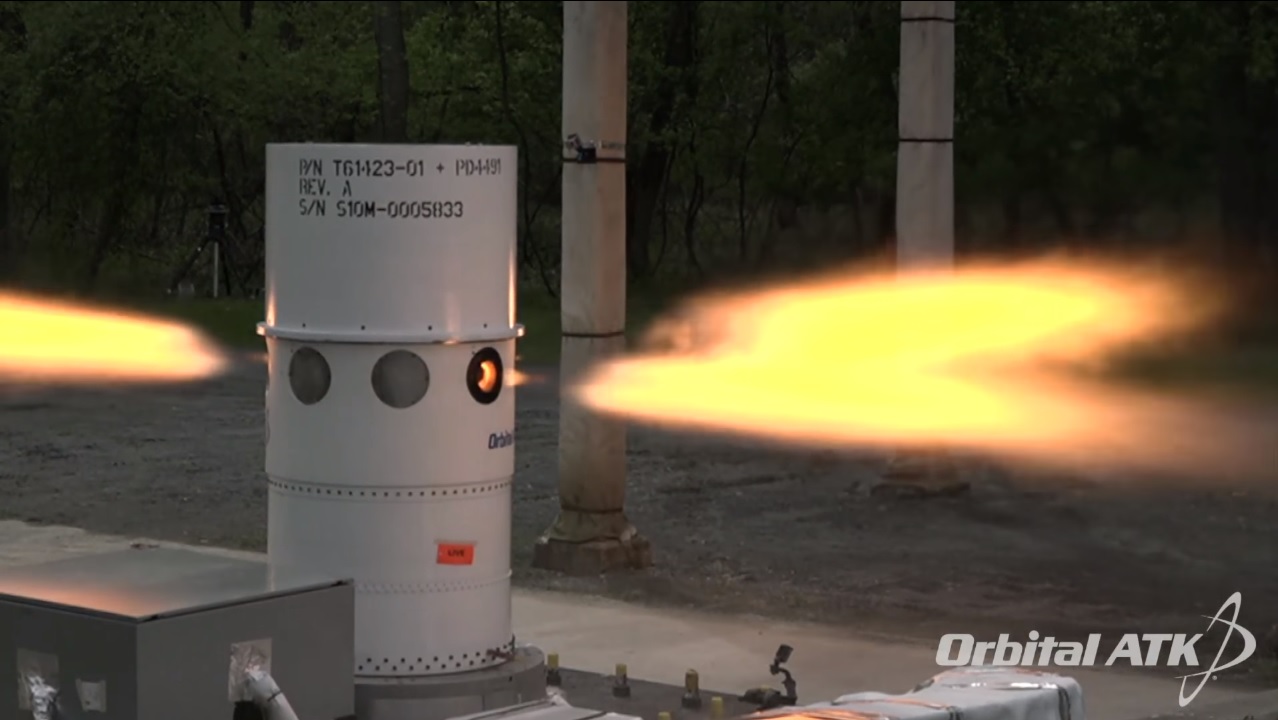The Abort Rocket Motor for NASA's Orion Spacecraft Just Aced a Big Test

Flanked by a forest view, a motor for the Orion spacecraft underwent a three-pronged fiery test ahead of being used for flights across the solar system.
Orbital ATK ran the abort system motor test successfully, the company announced yesterday (May 1). Footage from the test, whose location was not disclosed in a statement, showed fire emanating as planned from the motor before finishing with a puff of black smoke.
The attitude-control motor shown in the test is designed to steer the Orion spacecraft's crew module away from the launch vehicle if there is an emergency. Orion is a spacecraft NASA is developing to take crews away from Earth, to locations such as the moon's orbit or an asteroid.
"With the Orion spacecraft and Space Launch System, NASA has taken up the challenge of not just opening up space exploration, but making it as safe as possible for our astronauts," Pat Nolan, vice president and general manager of the missile products division of Orbital ATK's defense systems group, said in a statement.
"Orbital ATK is proud to support that vision with our innovative and reliable technology," he added. "The success of today's test brings us that much closer to seeing this vision realized."
The recent motor test is part of a series that is supposed to qualify the motor for the crewed flight missions. Orbital ATK is also producing the main launch abort motor that will propel the crew module away from the vehicle.
The Orion spacecraft underwent an uncrewed test flight in 2014, called Exploration Flight Test 1. The motors will be tested during the second flight, dubbed Exploration Flight Test 2, that will test both Orion and the Space Launch System late next year.
Breaking space news, the latest updates on rocket launches, skywatching events and more!
Recently, NASA said it is considering adding crew to the new test flight, which would loop around the moon before coming back to Earth.
"The study will examine the opportunities it could present to accelerate the effort of the first crewed flight and what it would take to accomplish that first step of pushing humans farther into space," NASA officials said in a statement in February.
Follow Elizabeth Howell @howellspace, or Space.com @Spacedotcom. We're also on Facebook and Google+. Original article on Space.com.

Elizabeth Howell (she/her), Ph.D., was a staff writer in the spaceflight channel between 2022 and 2024 specializing in Canadian space news. She was contributing writer for Space.com for 10 years from 2012 to 2024. Elizabeth's reporting includes multiple exclusives with the White House, leading world coverage about a lost-and-found space tomato on the International Space Station, witnessing five human spaceflight launches on two continents, flying parabolic, working inside a spacesuit, and participating in a simulated Mars mission. Her latest book, "Why Am I Taller?" (ECW Press, 2022) is co-written with astronaut Dave Williams.
